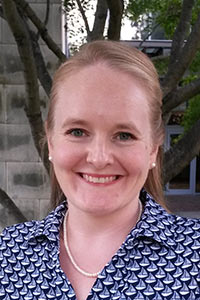Victoria K. Gibbs, Ph.D.
Victoria K. Gibbs, Ph.D.
Associate Professor in Biology
 Office:
Office:
Stephens Science Center 246
Contact Information:
Birmingham-Southern College
Department of Biology
900 Arkadelphia Rd
Birmingham, AL 35254
Office Phone: (205) 226-7812
Office Fax: (205) 226 3078
E-mail: [email protected]
Brief Career Background:
Dr. Gibbs completed her Bachelor of Science and Master of Science degrees in Biology in the Department of Biology at UAB. Her early graduate research studied the effects of temperature on reproduction and nutrient utilization in the sea urchin while working in the laboratory of Dr. Stephen Watts. Dr. Gibbs continued in the Watts Lab for her dissertation work to further pursue her interests in aquatic animal nutrition. She specialized in evaluating dietary lipid levels and sources for sea urchin growth. She earned her Ph.D. in Biology at UAB in 2011.
In August 2011, Dr. Gibbs joined the Department of Biology at Villanova University as the Postdoctoral Teaching Fellow in Organismal Biology where she collaborated with Dr. Michael Russell to study sea urchin interactions with rocky substrata. She team-taught courses in Human Anatomy and Physiology and Biostatistics and Experiment Design while co-mentoring undergraduate research projects. Dr. Gibbs also designed and taught a course in Nutritional Biochemistry for advanced undergraduate and graduate students.
Dr. Gibbs’s experiences in the laboratory and classroom reinforced her desire to research physiological responses to nutrition and the environment using different animal models. In June 2014, she started her two-year postdoctoral fellowship at UAB in the Department of Nutrition Sciences within UAB’s Nutrition Obesity Research Center (NORC) and the UAB Obesity Training Program. Dr. Gibbs worked with Drs. Tim Nagy and Daniel Smith, Jr. in multiple longevity intervention studies using murine models to investigate the influence of environmental and nutritional interventions on behavior, energetics, body composition, and healthspan.
Educational Background:
- Postdoctoral Scholar, Department of Nutrition Sciences, University of Alabama at Birmingham (2014-2016)
- Postdoctoral Teaching Fellow, Department of Biology, Villanova University (2011-2014)
- Ph.D. Biology, Department of Biology, University of Alabama at Birmingham (2011)
- M.S. Biology, Department of Biology, University of Alabama at Birmingham (2005)
- B.S. Biology, Department of Biology, University of Alabama at Birmingham (2003)
Research Interests:
- Physiologic responses to environmental and nutritional conditions
- Individual variation in behavioral and physiologic responses to stress
- Biology of aging; Digestive physiology and growth efficiency
- Alternative animal models; Aquaculture
Courses Taught:
BI 101 SM: Explorations in Biology
A course for non-science majors designed to provide an understanding of selected fundamental biological principles and processes. Two lectures and one three-hour laboratory per week. This course may not be counted towards the biology major. A Scientific Methodologies designated course.BI 115 SM: Organismal Biology
An introduction to the biology of organisms. Topics include levels of biological organization, biological diversity, plant and animal structure and function, and comparative study of structure and function relationships in living organisms. Designed for students who plan to major in biology or one of the natural sciences and/or who are pre-health. Three lectures and one three-hour laboratory per week. A Scientific Methodologies designated course. Prerequisite: BI 110 or HON 126. Fall, Spring.BI 442: Comparative Vertebrate Anatomy
A study of the phylogenetic development of chordate systems with special emphasis on the comparative morphology of a series of vertebrates. Three lectures, one three-hour laboratory, and one TBA laboratory per week. Prerequisite: senior standing or instructor consent. Fall.HS 200: Introduction to Nutrition
An introduction to the science of human nutrition and dietetics. Topics include essential nutrients and their relationship to health and metabolism, dietary recommendations for wellness, and an overview of nutritional requirements across the life course. Prerequisite: BI 110. Spring.HS 203: Human Physiology
A study of the fundamental functions of human organ systems and their significance to human health. Intended for students interested in pre-nursing, pre-pharmacy, allied health or related fields; not intended for pre-medical students. Prerequisite: BI 115. Fall.HS 499: Investigations into Human Biology and Health
A senior capstone exploration of a current problem in healthcare and/or human biology. Students conduct a literature review and develop and execute a research project investigating the problem. Topics and research approaches vary according to the interests of the students and professor. Prerequisite: senior standing. Exploration Term.

